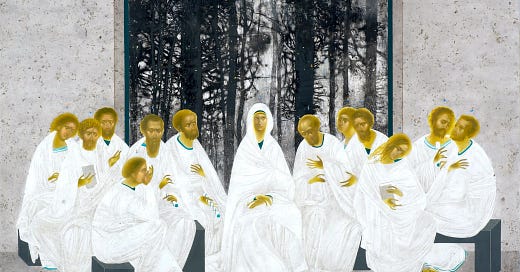The Church is an Event within an Event
God does not allow Jesus's Resurrection to be the anticipated End
Acts 2
The church tenders curious claim as it moves from the second to the third article of the creed credited to the apostles. Christians, the dogma requires, believe “in the holy, catholic, and apostolic church.”
The preposition makes all the difference.
It’s not, “I believe the holy, catholic, and apostolic church.” The baptized do not profess belief in the church’s testimony to the gospel. The church, oddly enough, is constitutive of that very gospel. It’s, “I believe in the holy, catholic, and apostolic church.”
How odd of God.
Jesus is personally the second identity of the triune God, yet what St. Augustine called the totus Christus (the whole Christ) is Jesus-with-the-church. No one recognizes the ridiculousness of such a claim more than a preacher; nevertheless, both creed and canon stipulate that the church is a work not of God’s creation but a work of God’s salvation. According to the prior logic of the creed, Christians believe in God the Creator, but of creation itself Christians believe only that it is creation. According to the culminating logic of the creed, Christians believe in God our End, but of that End itself Christians believe only that our final destiny is in him.
Quite simply, Christians do not place their faith in the things of this world except we do place our faith in one of the most unremarkable and unreliable creatures of the world, the church.
The church is not simply the fruit of God’s work of salvation.
She is its instrument.
The Risen Christ makes his body available to believers in the church as loaf and cup. The Risen Christ makes his body available to the world as the church. That the church herself is constitutive of the gospel, necessarily instrumental in God’s work of salvation, believers seldom notice. More often, the church is taken to be the accidental, and perhaps option, association of those still waiting on the Risen One’s return. This is one of the challenges posed to the church by the lectionary’s habit, mandated by the liturgical calendar, of reading narratives out of order.
For example, this Sunday’s assigned reading from Acts 2:
They devoted themselves to the apostles' teaching and fellowship, to the breaking of bread and the prayers. Awe came upon everyone, because many wonders and signs were being done by the apostles. All who believed were together and had all things in common; they would sell their possessions and goods and distribute the proceeds to all, as any had need. Day by day, as they spent much time together in the temple, they broke bread at home and ate their food with glad and generous hearts, praising God and having the goodwill of all the people. And day by day the Lord added to their number those who were being saved.
The lectionary assigns this passage, narrating the consequence of the Spirit’s outpouring upon the believers, during the season of Eastertide, prior to both the Ascension and Pentecost. What gets elided by so assigning it is this sheer and simple fact:
God institutes the church by not letting Jesus’s Resurrection be itself the End.
Don’t forget—
The hope of Israel, of which the Father’s raising of the Son is the first rumblings of an affirmative response, was that Resurrection would signal the culminating End of God’s history with his people. Easter, then, is only a partial answer to Israel’s hope.
God raised the crucified Jesus from the dead.
But the End has not yet come.
There is still more history.
The Catholic modernist Alfred Loisy derided the tradition by famously quipping:
“Jesus announced the Kingdom, but it was the church that came.”
Yet this is exactly so.
And this is precisely according to God’s providence.
Keep reading with a 7-day free trial
Subscribe to Tamed Cynic to keep reading this post and get 7 days of free access to the full post archives.




